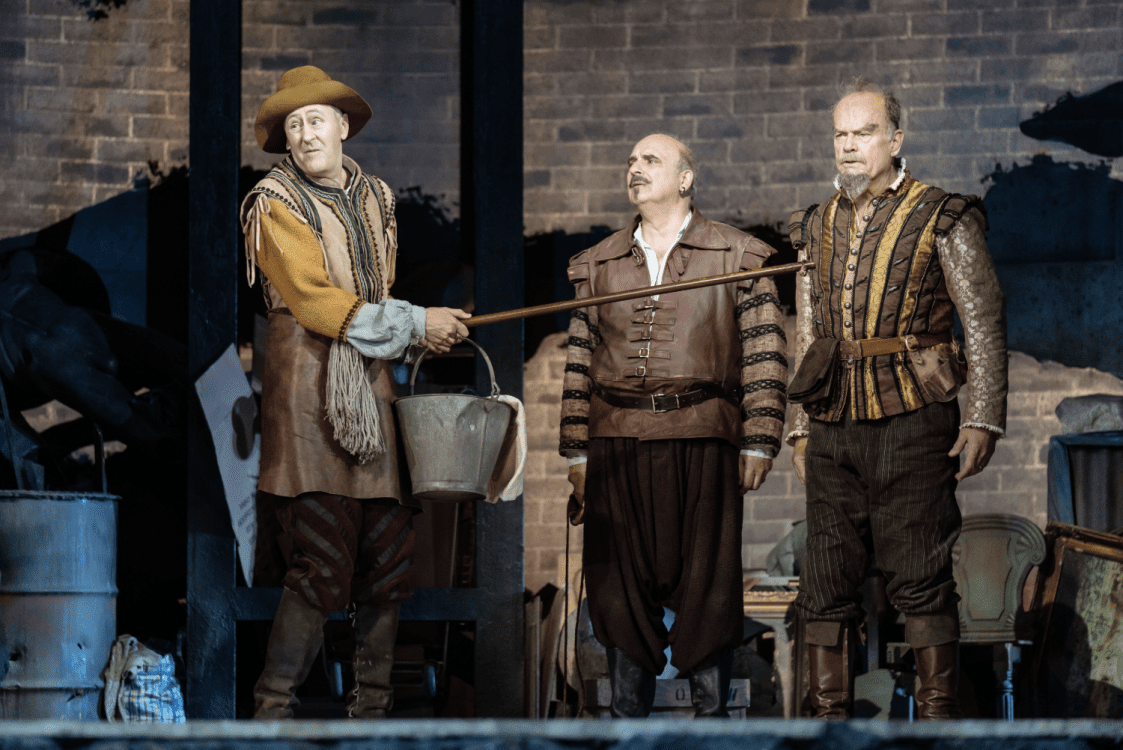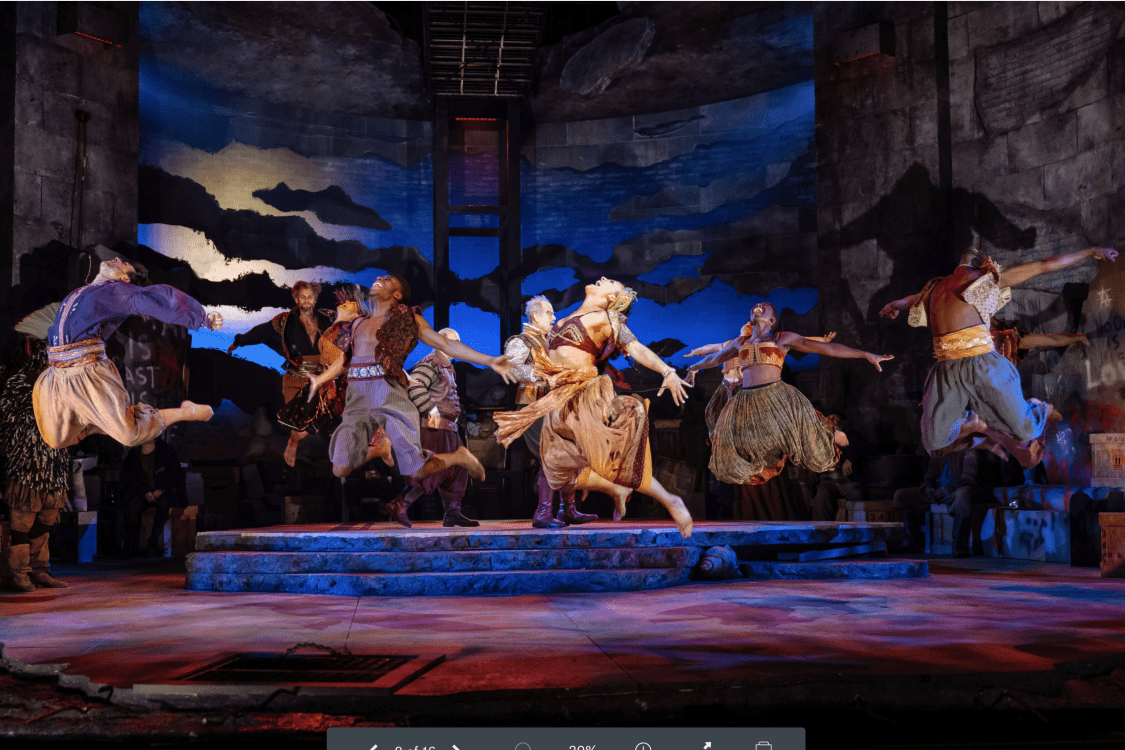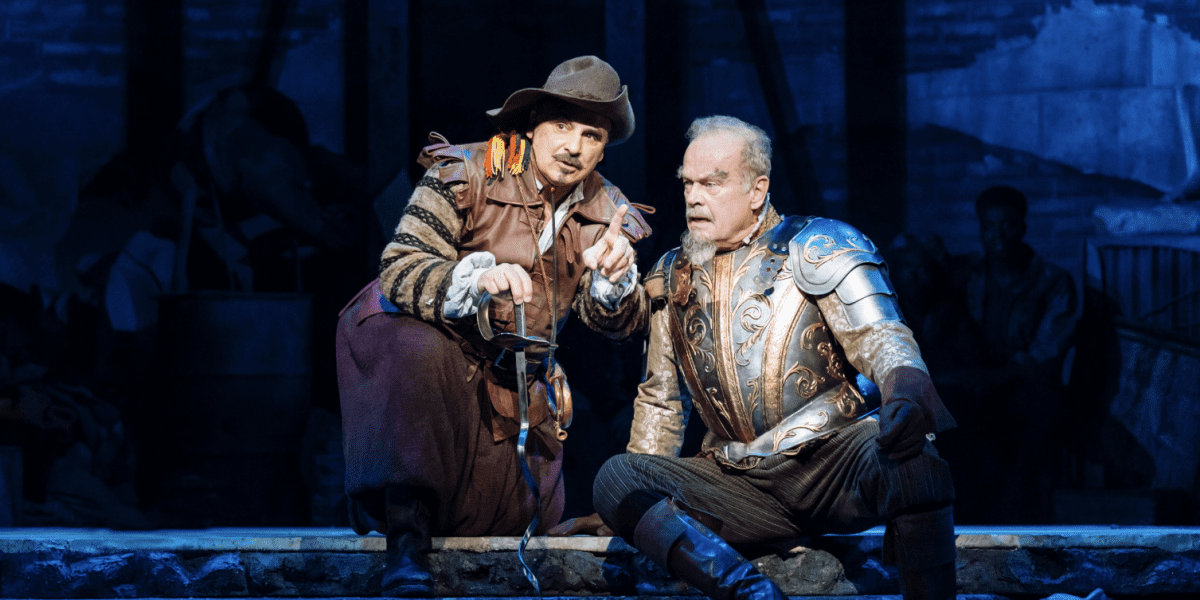Despite many successful revivals in the USA this musical has – incredibly – not been seen in London for fifty years. Of course there is one number – ‘The Impossible Dream’ – that has taken off on wings of its own and become a universally beloved anthem in the same way that ‘You’ll never walk alone’ has developed a life wholly independent of its origins in Carousel. What is of especial interest here is therefore how well the musical itself stands up in its own right as a show for our own times.
There is no doubt the original novel Don Quixote makes very good subject for a musical: there is lots of plot and a plethora of memorable characters; equal opportunities for comedy and pathos; dramatic set pieces and hectic crowd scenes on the one hand, and just as many moments of poignant isolation on the other. Above all there is that crucial ingredient of upward aspiration, the desire to transcend a squalid contemporary existence in favour of a world of dreams, which has been the key to unlocking many a musical in any age. Quixote may in his own tasteful phrase be ‘a man of illusion’ as much as delusion, but the broader message of striving to make a contribution of ‘grace’ to the world is one to which we can all relate. It is this aspect that makes the famous number ‘The Impossible Dream’ all the more powerful in its original context than the one in which we know it best.
But gratifyingly this revival reveals many other rich and different layers to this work – the score is delightful in its varied nods to Spanish musical style, with plenty of brassy swagger from the opening of the overture onwards, intermixed with poignant woodwind solos and memorable melody whether delivered by the chorus or the leads. There are lots of numbers that should be better known, and a clever framing device that sets up the dramatic scenario with tension and plausibly allows the tale to unfold.
The curtain rises on an elaborate set by James Noone, which takes us to the basement of a bombed-out museum. This ruin has been turned into a prison for those who have offended the state in various ways. A massive iron staircase-drawbridge descends from the flies to link this underworld with above ground (this owes a lot to the original Broadway set design by Howard Bay). Into this prison comes Cervantes/Don Quixote (Kelsey Grammer) to await interrogation by the Inquisition. But when he finds himself under investigation from his fellow prisoners and under threat of losing his precious manuscript novel he offers a defence in the form of a play-within-a-play. His trunk-load of costumes and props are distributed among the prisoners who then all assume roles in the adventures of the knight of the woeful countenance. And so we are underway..
In the original version there was no interval between the two acts, which would also be preferable here in order to sustain the continuous play-in-prison illusion. That said, there is no doubt that the key leads performed better after the break. The first half was cautiously played, with an obvious awareness of press night, whereas in the sequence of scenes that serves to demolish the claims of chivalry there was genuine intensity and focus to the performances. This was especially case in Grammer’s interpretation: in the first half his voice lacked strength and his acting seemed uncertain; whereas he rode the long phrases with more confidence once his first iteration of the big number was out of the way, and showed relaxed enough to offer more mobility and flexibility onstage.
Danielle De Niese, as a skilled and experienced diva, has all the vocal skill needed to project the feisty personality of Aldonza/Dulcinea. She dominated the scenes at the inn and was the focus of attention in all the episodes where she appeared. However, this role is not Carmen under another name, and there are more reserves of vulnerability to be found in this role, especially in the later stages in the wake of the genuinely ugly abduction/rape scene after which she merely appeared slightly disgruntled. Peter Polycarpou made less of an impression as Sancho Panza, but then he has rather less material to work with – the musical displaces Panza for Aldonza in many of the key scenes.

Beyond the core players there are some exquisite cameos of acting and singing that deserve separate mention. Nicholas Lyndhurst uses his veteran skills to deft effect as the drunken innkeeper, especially when he gets the chance to dub Don Quixote a knight with wonderful comic timing. Emanuel Alba sings and dances both pertly and expertly as the barber, and Minal Patel intones ‘The Psalm’ over the dying Quixote with sonorous power. Overall production values are excellent: the big-budget set does all that is required of it; there are some exquisite lighting effects especially in the vigil at the end of Act One in the build-up to ‘Impossible Dream’, and the slimmed down ENO orchestra (no strings) plays tastefully and powerfully under David White’s expert direction.
This musical is very entertaining to be sure, but it is much more than that on closer acquaintance, with the Don’s dying words seeming more prophetic than delusional as a commentary on our own times: ‘When life itself seems lunatic who knows where madness lies?’

